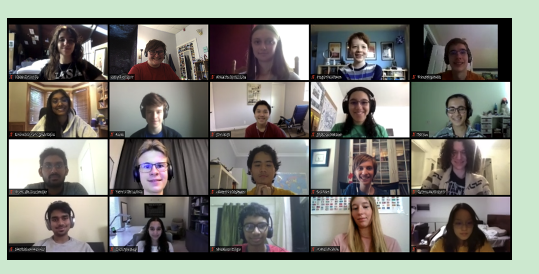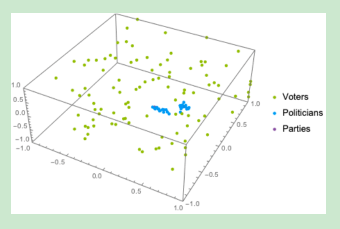
In the days of online learning and remote work, students are gaining valuable skills to help them navigate their education. With new needs for greater independence in their learning journeys, better time management and finding communities in unexpected places, students are already encountering important lessons. Student-centered events like the Wolfram Emerging Leaders Program help foster success in the workplace and in life, no matter what happens in the world.
Alongside these soft skills, more specific practices like computational thinking are at the forefront of the focused skills students need to develop in the modern world. The ability to break down problems into their component parts and to piece together a solution quickly and accurately is important for a variety of careers and pursuits in the twenty-first century. Even more important, perhaps, is that this skill enables you to express ideas clearly enough that even a computer can understand them.
Wolfram High School Summer Camp
As the director of the Wolfram High School Summer Camp in 2020, I was privileged to work with a group of smart, passionate teenagers as they built a variety of really interesting projects. Camp in 2020 was a very different experience to camp in previous years. We had a whole new leadership team, and, of course, the entire program was remote. Our students this year were, in some ways, faced with a more challenging learning environment than in previous years, but they rose to the occasion. They built some amazing projects, learning to code and apply computational thinking skills even more thoroughly than in 2019.

Like the Wolfram High School Summer Camp this year, the Wolfram Emerging Leaders Program met virtually. Here is an example of a remote “gathering” where 2019 and 2020 camp alumni used interactive technology to listen to WELP’s final presentations, play games and listen to music. It was a unique opportunity to get back together with old friends and meet new people from the previous camp year.
At the Summer Camp, students spend the first few days each year learning how to code in the Wolfram Language. With the help of our specially designed curriculum, which focuses on problem solving and active learning, students get up to speed incredibly quickly. They often go from zero coding experience to wrangling their own neural nets and performing complex image processing tasks in just a couple of days.
Once students have mastered the raw skill of coding and have been primed on their computational thinking skills through planned activities and mini-projects, we let them loose on an independent project for the remainder of the camp. Each student works with Stephen Wolfram to find a project that suits them and their goals, and then, with the support of an expert mentor in their field, they take the project from a short description to a finished product.
For many of our students, this is the first time they have completed a complex independent project. It’s also often the first time they have been able to dedicate a serious chunk of their time to one idea, a very different learning environment to switching topics with the school bell. We have found that students flourish under this model, and in 2020, projects ranged from digital contact tracing simulations, to looking for multiway systems of intermediate growth, to simulating audio with different arrangements of speakers.
Wolfram Emerging Leaders Program
The Wolfram Emerging Leaders Program (nicknamed “WELP” by our students in 2019) takes a selection of the Summer Camp students and asks them to join us for the fall semester to complete a remote group project. Where the Summer Camp is a boot camp in coding, computational thinking and fast iteration, WELP is a deep dive into project work, team management, advanced coding and skill sets like design and computational thinking.
The first item on WELP’s agenda is to split the students into groups based on their interests, skills, goals and time zones. The focus of the program is entirely on the students and their development, so they are given very vague reasoning for why they were teamed up. For example, one group was told that they shared an interest in biology and education; they ended up doing a project focused on simulating how voters’ opinions change during an election.
The program is split into five key stages. The first stage is a design thinking workshop, where students learn how to come up with ideas and make rapid prototypes. The second, third and fourth stages are based partly on IDEO’s design thinking steps: ideation, iteration and implementation. In the final stage, students work on presenting their projects: writing computational essays and preparing their presentations for our poster session.
Stage 1: Design Thinking Workshop
In the first week of WELP, students attend an afternoon of workshops focused on design thinking. This workshop helps them to discover new techniques for idea generation, design and concept building, as well as giving them the opportunity to bond with their project team.
We use design thinking because it empowers students never to feel judged on their ideas, creating a sense of intellectual curiosity and openness that allows even late-in-the-game thoughts to come forth as the strongest project goals. This is in direct contrast to some traditional classrooms, where students run with less-than-stellar ideas simply because they are afraid that their first idea was “wrong.” In WELP, there are no wrong ideas, only steps on the path to creating something awesome.
Stage 2: Ideation
The objective of the ideation stage is for each group to come up with a core goal for their project and figure out exactly what they want to achieve in WELP. Students look at problems and issues they see in the real world and try to come up with interesting solutions or explorations to fit their interests. They then try to match their goals with the capabilities of both Wolfram technologies and their own skills.
Stage 3: Iteration
Once their projects have been approved, the teams move on to iteration. Iteration is all about generating solutions to the problem statement identified in the previous stage. This stage motivates students to use their diverse thinking skills to come up with potentially dozens of possible solutions before choosing their favorite and sticking with it.
By the end of this stage, students have a minimum viable product (MVP). Throughout the process, they’ve been encouraged to do “quick and dirty” code to create weird and wonderful solutions for several of their ideas. The quality of their coding is never commented on in this phase; it’s all about the idea, the solution and the all-important skill development the students are working on.
Stage 4: Implementation
While their MVP goes a long way to addressing the problem they’ve identified, students focus on fully realizing a single idea in the implementation stage. By this point, they are dramatically more prepared to execute their solutions than they were at the start, having had plenty of time to experiment, fail and grow in the previous stages.
Stage 5: Presentation
It’s great to have a solution to a problem and to be a good coder, but none of that will get you very far unless you can present your ideas to other people. In this phase, students write a computational essay, an interactive essay interspersed with code and graphics that they can deliver to anyone in the world.
Students also practice for their presentations, delivered to Summer Camp alumni, mentors, Stephen Wolfram and other Wolfram Research staff members. It’s a great opportunity to show off their hard work and develop some crucial public-speaking skills.
WELP 2020 Projects
By the end of the 2020 program, all of the groups had produced high-quality computational essays. The variety and depth of their explorations were astounding, and the skills they developed during the program were obvious in their final products.
Using Linguistic Analysis to Computationally Replace Given Similes »

This linguistically oriented group worked to replace every simile in a piece of text with another contextually relevant choice of words. For example, you could type “as fast as a rabbit” into their cloud-deployed form and have “as speedy as a cheetah” returned to you.
A novel use of Wolfram’s text analysis, this tool is useful to writers, ESL teachers and those of us who enjoy using insult generators to roast our friends. The function returns such gems as “you are as brainsick as a possum” and “I am as beautiful as a glistening cornflower.”
Using Hexagonal Cellular Automata to Model Flooding »
This environmentally conscious team decided to use cellular automata to model flooding, making a simulation that shows how water pools in places with varied elevations.

This model was able to find locations on real-world maps where flood water would gather, a genuinely useful result in our unpredictable climate.
Political Idea Blocking—Simulating Political Change »
This group took some fascinating research into how ideas spread through populations, combined it with research on how different political ideas are connected (for example, the idea that we can assume with some degree of accuracy someone’s view on gun control when told their view on abortion) and made a massive simulation of how an individual’s ideas can change based on their context.
Bringing in agents such as the media, politicians, influencers and political parties, this team was able to create cluster maps of ideas as they moved through the population.

While their simulation is based on some assumptions about idea spread, those assumptions are well researched and founded in a level of political theory that is certainly not required for WELP.
Acoustic Modeling with Generated Depth Maps »
This team aimed to take photos of real places and simulate broadcasting audio from different locations in the image. They were able to create interesting 3D depth maps of locations, translate those maps into Boolean regions and play sound over various 3D objects. They didn’t quite manage to broadcast sound over their depth maps.

This is a great example of a project that went exactly the way it was supposed to go. The students learned huge quantities of math, physics, image processing and sound engineering as well as the coveted skill of knowing when enough is enough and letting the project go. WELP is a learning experience, not a project factory, and we are far more interested in learning than in polished essays.
Takeaways from WELP
I had a great time mentoring and guiding the 2020 WELP students through this program. They worked exceedingly hard to complete projects that I would have had no hope of completing at their age, and watching them develop their thinking and coding skill sets was an absolute joy.
As demonstrated by the 2020 projects, students learn a variety of vital skills over the course of this program.
Several of the WELP 2020 students will be attending Summer Camp 2021 as teaching assistants, so it will be amazing to see their new skills in action as they pass them on to the next cohort. As teaching assistants at the Summer Camp, they will be tasked with designing and delivering casual learning opportunities to help new students get started on their own computational thinking journeys.
© Copyright 2000-2025 COGITO SOFTWARE CO.,LTD. All rights reserved